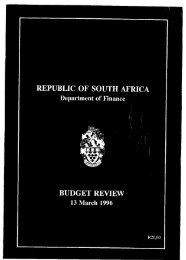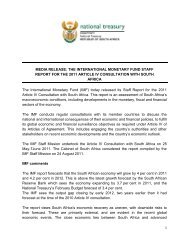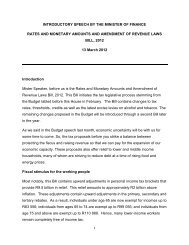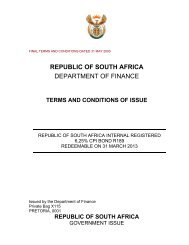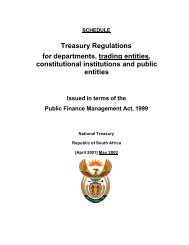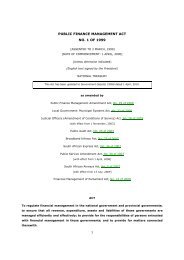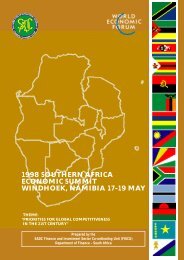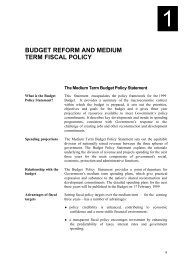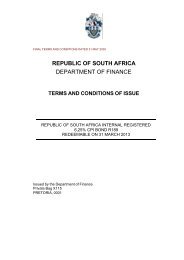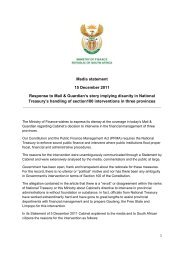Annual Performance Plan Jaarlikse ... - National Treasury
Annual Performance Plan Jaarlikse ... - National Treasury
Annual Performance Plan Jaarlikse ... - National Treasury
You also want an ePaper? Increase the reach of your titles
YUMPU automatically turns print PDFs into web optimized ePapers that Google loves.
• Learner Transport<br />
It is not always possible to build schools within a 5km radius of every learner. To make it possible for these learners to<br />
reach their nearest suitable school, the department has put other measures in place. These include the provision of a<br />
learner transport scheme or the payment of either a boarding bursary or transport bursary to needy learners to ensure<br />
that they reach school. Boarding in hostels can also be considered although this also has its problems (high expenses,<br />
learners can’t reach home over weekends, etc.).<br />
It is the current policy of the WCED to transport Grades 1 – 12 learners who reside more than 5 kilometers away from<br />
their nearest schools. In this regard, the WCED deals with the administration of ± 490 learner transport routes<br />
transporting ± 47 000 learners to school on a daily basis.<br />
A learner transport scheme will not be instituted for less than 10 learners on a specific route and/or within a radius of<br />
5km from a learner’s home, but deviations can take place under extraordinary circumstances for example physically<br />
handicapped learners attending mainstream schools.<br />
The learner transport policy is currently under review.<br />
• e-Education<br />
The national e-Education White Paper makes provision for a number of strategic objectives, viz. professional<br />
development, ICT infrastructure, electronic content resources, connectivity, community involvement and research and<br />
development. Through various existing WCED ICT projects, including the Khanya Project, the Schools Connectivity<br />
Project and the Curriculum website, all of the objectives are being addressed.<br />
In the 200708 – 2009/10 MTEF period the Khanya Project will provide the balance of the outstanding public schools<br />
with at least one computer facility, the majority of the educators in the province will have received basic ICT training, all<br />
the schools will be connected to the Internet via a high bandwidth connection and additional electronic resources will be<br />
made available (either via the WCED’s Curriculum website or via the national Thutong Education portal).<br />
• <strong>National</strong> School Nutrition Programme (NSNP)<br />
The responsibility for the management of the NSNP was transferred from the provincial Department of Health to the<br />
Department of Education on 1 April 2004.At that time 145 596 learners in Grades R to 7 were fed across approximately<br />
659 targeted primary schools in the province.<br />
Since then, the poorest special and secondary schools were also included into the NSNP and currently approximately<br />
203 600 learners are fed across 993 targeted primary, special and secondary schools.<br />
During the time that the programme was transferred, only one uncooked menu option was provided on every feeding<br />
day. Since January 2006 cooked menu options were successfully piloted at 44 primary schools across the seven<br />
EMDCs. These menu options were systematically extended to other targeted schools and it is expected that all targeted<br />
schools would have been afforded the opportunity to serve cooked meals by March 2007.<br />
The NSNP enabled all targeted schools to purchase kitchen equipment in order to prepare cooked meals. Many<br />
targeted schools do not have adequate food preparation areas and the NSNP enabled 85 targeted schools to construct<br />
durable and secured pre-fabricated mobile units.<br />
All funded staff vacancies were filled, although not all the posts on the establishment could be funded. It was not<br />
possible to fund a Liaison officer post at each EMDC in the metropole areas.<br />
Monitoring tools, information booklets and guidelines were disseminated to all targeted schools. At more than 90% of<br />
the targeted schools volunteers responsible for the preparation of meals and in some cases relevant educators were<br />
trained in gas and food safety and the storage of food.<br />
The monthly honorarium payable to volunteers and the total number of volunteers were increased by up to 400% and<br />
241%, respectively.<br />
213 Targeted schools currently have food gardens. Workshops covering topics such as the establishment of a food<br />
garden and the making of compost were conducted in several EMDCs, covering the rural and nodal areas. Educators,<br />
learners and parents attended these workshops.<br />
<strong>Annual</strong> <strong>Performance</strong> <strong>Plan</strong> 2007/08 – 2009/10<br />
41



